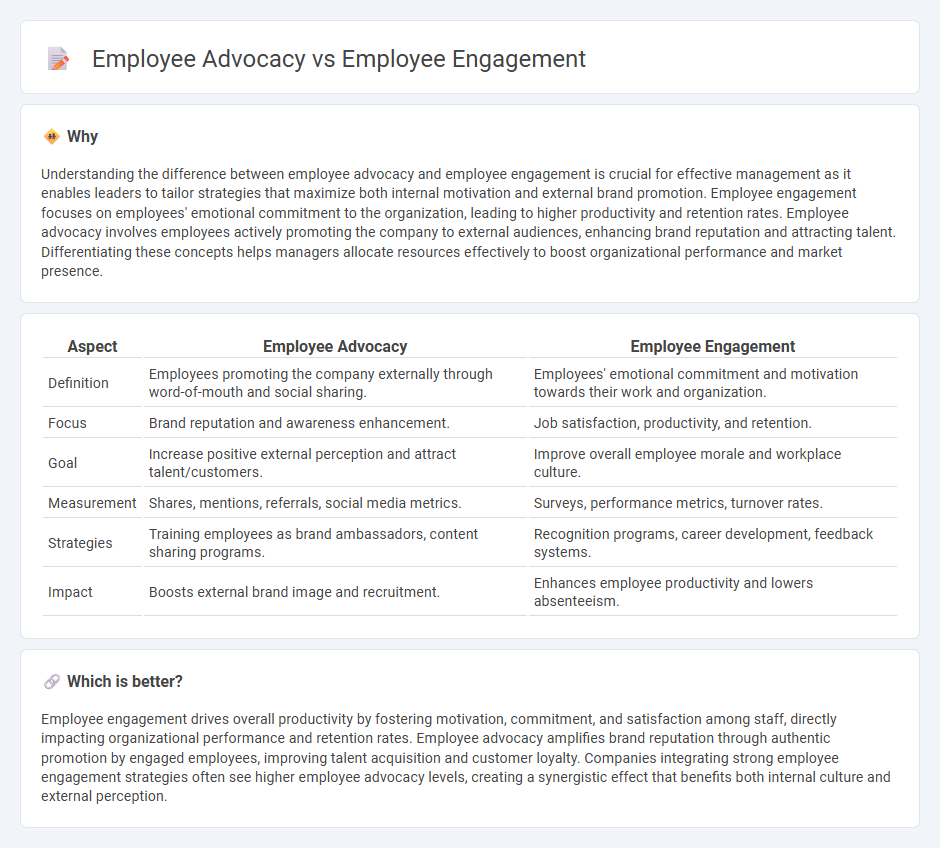
Employee advocacy leverages employees as brand ambassadors to amplify company messages and enhance reputation, while employee engagement focuses on fostering emotional commitment and motivation toward organizational goals. Both strategies drive productivity but differ in emphasis: advocacy promotes external communication, engagement nurtures internal satisfaction. Explore how integrating these approaches can maximize workforce impact and business success.
Why it is important
Understanding the difference between employee advocacy and employee engagement is crucial for effective management as it enables leaders to tailor strategies that maximize both internal motivation and external brand promotion. Employee engagement focuses on employees' emotional commitment to the organization, leading to higher productivity and retention rates. Employee advocacy involves employees actively promoting the company to external audiences, enhancing brand reputation and attracting talent. Differentiating these concepts helps managers allocate resources effectively to boost organizational performance and market presence.
Comparison Table
| Aspect | Employee Advocacy | Employee Engagement |
|---|---|---|
| Definition | Employees promoting the company externally through word-of-mouth and social sharing. | Employees' emotional commitment and motivation towards their work and organization. |
| Focus | Brand reputation and awareness enhancement. | Job satisfaction, productivity, and retention. |
| Goal | Increase positive external perception and attract talent/customers. | Improve overall employee morale and workplace culture. |
| Measurement | Shares, mentions, referrals, social media metrics. | Surveys, performance metrics, turnover rates. |
| Strategies | Training employees as brand ambassadors, content sharing programs. | Recognition programs, career development, feedback systems. |
| Impact | Boosts external brand image and recruitment. | Enhances employee productivity and lowers absenteeism. |
Which is better?
Employee engagement drives overall productivity by fostering motivation, commitment, and satisfaction among staff, directly impacting organizational performance and retention rates. Employee advocacy amplifies brand reputation through authentic promotion by engaged employees, improving talent acquisition and customer loyalty. Companies integrating strong employee engagement strategies often see higher employee advocacy levels, creating a synergistic effect that benefits both internal culture and external perception.
Connection
Employee advocacy and employee engagement are intrinsically connected, as engaged employees are more likely to become passionate advocates for their organization, promoting its values and services authentically. High levels of employee engagement boost morale, job satisfaction, and commitment, which translate into genuine employee advocacy that strengthens brand reputation and attracts talent. Organizations that invest in engagement strategies see increased advocacy, driving both internal cohesion and external business growth.
Key Terms
Motivation
Employee engagement reflects the level of enthusiasm and emotional commitment employees have toward their organization, which directly influences motivation and overall productivity. Employee advocacy goes beyond engagement by motivating employees to actively promote and endorse the company's values, products, or services externally, often driven by a strong sense of pride and alignment with the brand. Explore deeper insights on how motivation differentiates employee engagement and advocacy strategies to enhance workplace culture and business growth.
Communication
Employee engagement centers on fostering open, transparent communication to build trust and commitment, ensuring employees feel valued and connected to the company's mission. Employee advocacy leverages this foundation through employees actively sharing positive messages and promoting the brand externally via social media or word-of-mouth, amplifying organizational reputation. Discover how strategic communication bridges engagement and advocacy to drive stronger business outcomes.
Organizational Culture
Employee engagement reflects how emotionally invested employees are in their work and company goals, directly influencing job satisfaction and productivity within an organizational culture. Employee advocacy occurs when engaged employees actively promote the company's values, mission, and products to external audiences, strengthening the brand reputation and trust. Explore how fostering a culture that blends engagement and advocacy can drive sustainable business growth.
Source and External Links
Why Employee Engagement Is Key to Company Success - Employee engagement boosts productivity by 18% and profitability by 23%, highlighting its importance for organizational success.
Improve Employee Engagement in the Workplace - Engaged employees lead to higher productivity, profitability, and customer loyalty, with Gallup research showing significant benefits across various business outcomes.
What is Employee Engagement? (And How to Boost It) - Employee engagement enhances productivity, retention, customer satisfaction, and organizational performance by fostering a sense of value and connection among employees.
 dowidth.com
dowidth.com